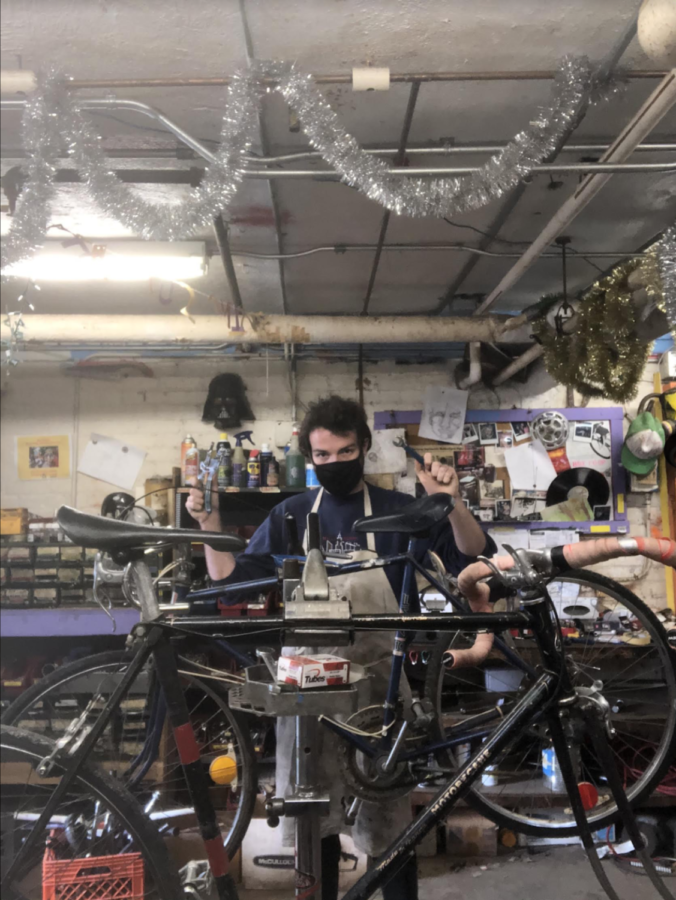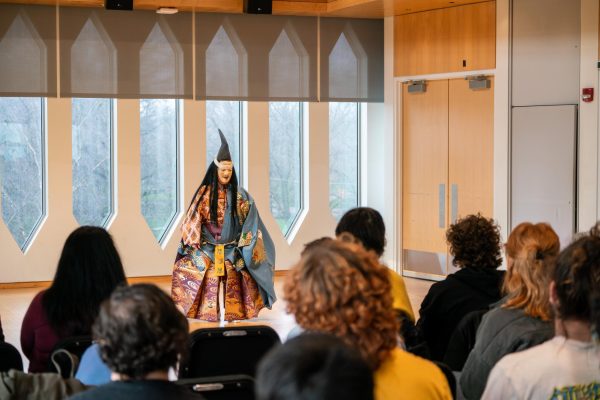Bike Co-op Calls For New Recruitment To Survive
College fourth-year Tom LoVoi puts in a mechanic shift at the Oberlin Bike Co-op, which is looking for new first- and second-year members.
When Oberlin’s campus shut down last March, the Oberlin Bike Co-op closed with it. Upon reopening for the fall semester, the College worked with the Bike Co-op to develop safe COVID-19 guidelines — but the co-op’s cramped interior architecture made social distancing more difficult. While the Bike Co-op has been a bustling hub for student life for the past 35 years, a lack of first-year members means it’s now entering an uncertain future.
The co-op’s small and poorly ventilated rooms have prevented senior members like College fourth-year Ava Zuschlag, the co-op’s current co-president, from recruiting and training new members.
“[The pandemic] messes up a lot because everything is passed down through teaching and shared experience,” said Zuschlag. “A lot of positions have a one-semester overlap, so the person who has had the job for a semester can then teach the next person and so forth. [But] we haven’t had everyone on campus.”
While the new three-semester plan has disrupted the passing of institutional knowledge, the co-op’s leadership began holding outdoor workshops this spring to increase membership and preserve traditions. These workshops present a valuable opportunity for students — especially first- and second-years — to participate in the reinvigoration of a beloved Oberlin institution.
More than just a bike repair shop, the Bike Co-op has a long history of community service, inclusion, and accessibility. And, after 35 years of community donations and purchases, the space has accumulated a surplus of materials.
“It’s just filled to the brim with bike parts and half-assembled bikes,” said College fourth-year Sam Blieden, the co-op’s current co-president. “You find a lot of cool stuff when you dig around.”
After a certain number of shifts, each Bike Co-op mechanic is allowed to build their own bike from parts the co-op has on hand. College fourth-year Tom LoVoi, former co-president, said the opportunity to build a bike is an important draw for new members.
“For people that I’ve met who go to the Bike Co-op, that is such a big part of why you go,” said LoVoi. “You’re like, ‘oh my God. I could build my own bike from scratch.’”
The organization encourages students to use these parts and tools, regardless of their prior knowledge of bicycle repair skills.
“One of the greatest tenets of the Bike Co-op that attracted me to it initially was that you didn’t have to know anything about bikes,” said Conservatory fourth-year Hannah Sandoz, the co-op’s president in 2019. “It was just a space where anyone could come and hang out and feel welcome.”
When students first start working at the Bike Co-op, many don’t know much more than how to change a tire. But the co-op’s value for learning on the job enables interested students to learn a multitude of skills. For Sandoz, this has already enabled them to work as a paid bike mechanic, providing job opportunities for the rest of their life.
“[The bike mechanic position] is a universal transferable skill that I can take with me anywhere I go, because there’s not a single part of the earth aside from probably Antarctica where people aren’t riding bicycles and needing them repaired,” Sandoz said.
Those hard-earned skills are easily transferred through the co-op’s core value of peer-to-peer education, which benefits both members and patrons. The co-op’s mechanics are trained not only to operate the shop, but also to teach newcomers how to do their own repairs. When a patron visits the co-op, the mechanic actually guides them through the process of how to fix their own bike, rather than simply doing it for them.
The outdoor workshops combined with scheduled group rides in the coming months will hopefully provide ample opportunity for growth in the co-op’s membership. While the obstacles look daunting, Sandoz has faith that the organization will stick around.
“I do think that as long as we’re able to carry on the message of why the Bike Co-op needs to stay, that that rebirth will happen successfully,” they said.
This semester, the Bike Co-op is accepting new members at any time. Interested students can email the co-op at bikecoop@oberlin.edu or contact the organization via their Facebook page for more information.










